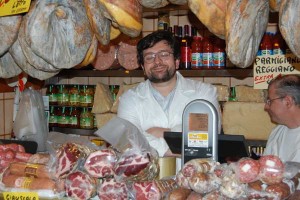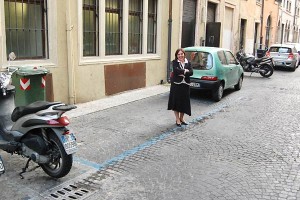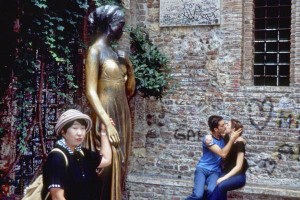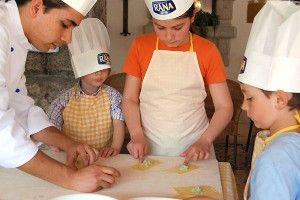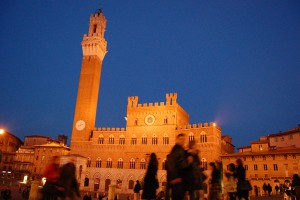 I was in Siena the other day. To me, it’s a capital of humanism. The Sienese are so self-assured. They remember their centuries-old accomplishments as if they reflect well on them today.
I was in Siena the other day. To me, it’s a capital of humanism. The Sienese are so self-assured. They remember their centuries-old accomplishments as if they reflect well on them today.
In this “land of a thousand bell towers,” they have the tallest and they seem the proudest. But my hunch is that it’s probably just an inferiority complex showing because their rival Florence is synonymous with the Renaissance, Michelangelo, and Leonardo. Say “Siena,” and you think panforte (fruitcake), a donkey race where there are no rules, and a Crayola color.
Siena does have my vote for the finest square in all of Europe. (Okay, blog-travelers, I’m curious — what’s your favorite square, and why?) Il Campo is a clamshell-shaped “square” of red brick where people hang out as if at the beach. It slopes gradually down to a grand building — not a church with a spire, but a crenellated city hall with a bell tower — the tallest in Tuscany. It stands like an exclamation point proclaiming that as a community, Siena comes together and makes life better for all.
Savoring a solitary moment here with a glass of vin santo (desert wine — borrowed from the restaurant) when the twilight sky is the same brightness as the rustic stones of Il Campo is a ritual for me.
Inside that city hall is a famous fresco called The Effects of Good Government. It’s 12.6 meters wide. Exactly 6.3 meters is devoted to the city, and 6.3 meters to the country — symbolizing how both need and help each other equally. (My hunch is that it was 14th-century propaganda to con the country folks into thinking they were respected by the urbanites who ruled them.)
 If it’s true a society builds it tallest towers to its greatest gods (the architectural equivalent of “where your treasure is, there also you’ll find your heart”), then Siena worships secular effectiveness more than it trusts in God.
If it’s true a society builds it tallest towers to its greatest gods (the architectural equivalent of “where your treasure is, there also you’ll find your heart”), then Siena worships secular effectiveness more than it trusts in God.
But Siena has a fine church, too. My guide took me in. When entering a church with me, my European friends normally sense I’m a Christian by my respect for the people and building and art. And this month, it seems every guide I’ve had (even in famously un-churched Italy) has touched the holy water and respectfully crossed themselves when we enter. On this day, though, my guide went on a little rant. She said, “We young Italians no longer go to church. We refuse to hear some old man telling us what we cannot do from that pulpit.”
Then we walked to the votives, where locals hang tokens of thanks to God for prayers answered. Next to the baby shoes, photos of healed people, and silver plaques with body parts pounded into them, was a corner that looked like a big hat rack at a race track. There, hanging obediently, were twenty bright and aerodynamic motorcycle helmets. I guess even young people who don’t like being told what they cannot do need to thank someone when they survive a motorcycle wreck.
Stepping outside, I saw a young Italian wearing a T-shirt declaring, “God is a DJ.”
